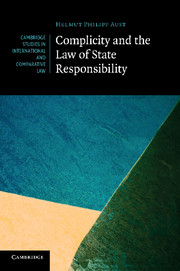Book contents
- Frontmatter
- Contents
- Foreword
- Preface
- Table of cases
- Abbreviations
- 1 Introduction
- 2 Complicity between bilateralism and community interest
- 3 Complicity and the international rule of law
- 4 Complicity in customary international law
- 5 The concept of complicity in Article 16 ASR
- 6 The consequences of complicity
- 7 Complicity and aggravated responsibility
- 8 A network of rules on complicity
- General conclusions
- Bibliography
- Index
5 - The concept of complicity in Article 16 ASR
Published online by Cambridge University Press: 07 September 2011
- Frontmatter
- Contents
- Foreword
- Preface
- Table of cases
- Abbreviations
- 1 Introduction
- 2 Complicity between bilateralism and community interest
- 3 Complicity and the international rule of law
- 4 Complicity in customary international law
- 5 The concept of complicity in Article 16 ASR
- 6 The consequences of complicity
- 7 Complicity and aggravated responsibility
- 8 A network of rules on complicity
- General conclusions
- Bibliography
- Index
Summary
During the 2003 attacks on Iraq, Ireland, a traditionally neutral State, allowed US military aircraft to stop over at Irish airbases. A citizen initiated High Court proceedings on the constitutionality of what he viewed as Irish participation in the Iraq war. In order to substantiate his claim, the plaintiff relied on Article 16 ASR: he intended to show that Irish participation in the attacks would be wrongful under international law. The Irish High Court was not willing to rule on the matter, but, nonetheless, made the following remark:
The issue of ‘participation’ is not a black and white issue. It may well ultimately be, as stated by the Taoiseach, a matter of ‘substance and degree’. However, that is quintessentially a matter for the Government and the elected public representatives in Dáil Eireann to determine and resolve. In even an extreme case, the court would be still obliged to extend a considerable margin of appreciation to those organs of State when exercising their functions and responsibilities under Article 28 [of the Irish Constitution,].
Although the Court thus did not want to pass a judgment on the issue, it highlighted one of the crucial issues concerning complicity in international law: what actually counts as aid or assistance triggering responsibility of the supporting State? In order to identify what form of conduct is eligible in this regard, a further issue needs to be dealt with: the requisite degree of knowledge or intent on the part of the complicit State. This subjective element is also likely to cause greater problems. As Philippe Sands has remarked, it is exactly ‘the crux of the issue on complicity: What is the extent of the Government’s obligation to satisfy itself that no internationally illegal acts are occurring?’ Article 16 ASR and its commentary do not necessarily provide answers to these questions.
- Type
- Chapter
- Information
- Complicity and the Law of State Responsibility , pp. 192 - 268Publisher: Cambridge University PressPrint publication year: 2011
- 1
- Cited by



